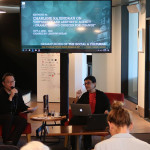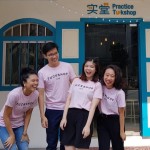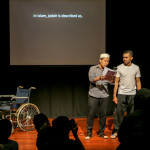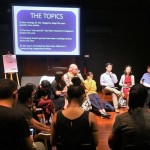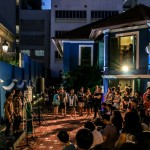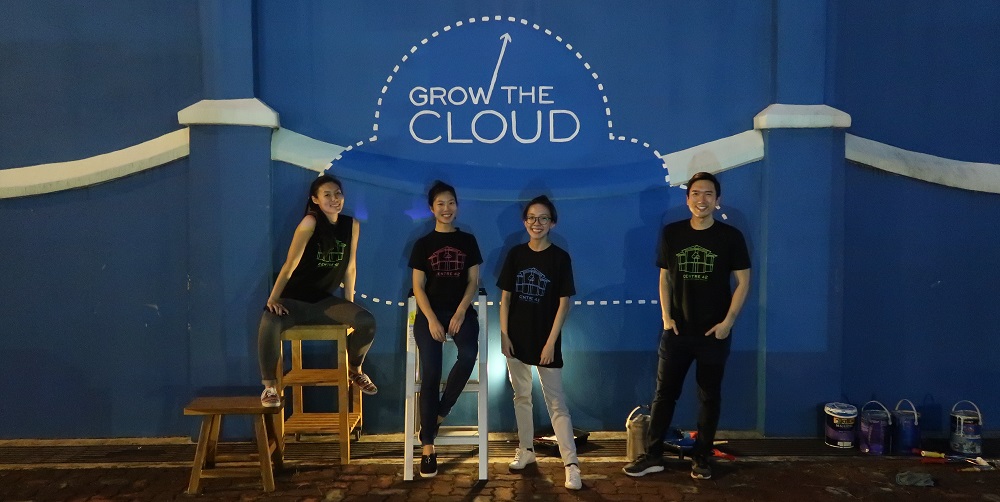
Support the work that we’ve been doing at Centre 42 by helping us “Grow the Cloud”!
The past five years have been exciting for us here at Centre 42. Since we opened our doors in April 2014, we have been home to more than 150 artists and theatre collectives, and supported the development of over 170 new theatrical projects. But as we strive to do even more for the scene in the coming years, we need your help!
While the National Arts Council does provide us with some funding, we are still required to raise at least 45% of our annual operations costs in order to sustain the company. As one part of our efforts to do that, we are launching a fundraiser called “Grow the Cloud”, where we hope to garner support in the form of donations from those who believe in our mission. Our goal for this initiative is to raise $20,000 by the end of 2019.
We chose the symbol of the cloud for this campaign not only because it is such an integral part of our identity – it is the shape of our logo, after all – but also because clouds play an important role by providing shelter from the sun. And when the clouds get big enough, it rains, which helps things to grow. The idea is that by donating and adding to our “cloud bank”, you will enable us to continue supporting and growing Singapore’s theatre scene through our myriad of programmes and initiatives.
Breaking new ground
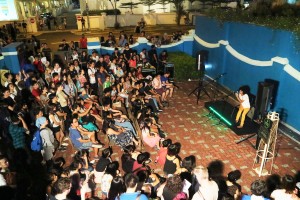
Late-Night Texting has become a crucial platform for us to showcase new local writings in the last few years.
When Centre 42 was first conceptualised, its main purpose was to address “the lack of consistent new writings for Singapore,” as our co-founder and executive director Casey Lim once put it. Our suite of programmes were thus designed to provide different ways to support the creation and development of text-based works for the local stage.
One of our biggest and most public platforms that champions this cause is Late-Night Texting. Over the last three editions, we have brought bite-sized theatrical experiences to over 14,000 audience members as part of the Singapore Night Festival. The event is an opportunity for us to programme works by groups that we’ve built a relationship with. They include Dark Matter Theatrics, GroundZ-0, Main Tulis Group, and The Second Breakfast Company – all of whom have created or curated a series of 10- to 30-minute short plays for our annual shindig, some of which will be published in anthologies by BooksActually in the coming months.
“Centre 42 has been a crucial source of emotional, spiritual and physical support for Main Tulis Group. It’s been there for us from the start, from the time when [our group] was just a seedling of an idea in 2016, to becoming home of our meetings. It also gave us our first public presentation platform at Late-Night Texting, with ‘ETA: 9 MIN’ in 2017 and again in 2018,” says Nabilah Said, the founder of the Malay playwrights collective.
“Late-Night Texting afforded us the space and resources to continue our work on bringing to the fore old Singapore works and exploring new ways of looking at them,” add The Second Breakfast Company, who juxtaposed excerpts from pre-2005 and post-2005 local plays about love in “Lovebites”. “With the platform given to us, we were able to juxtapose old works with new ones, which allowed for meaningful reflection about the repertoire of Singapore works, how we have evolved (and how much) and what Singapore society is about.”
Indeed, another central part of our mission is to encourage artists to revisit plays that have come before. As such, we regularly commission contemporary responses to existing works in our local theatre canon under a programme called The Vault. For instance, in 2017, we worked with Alfian Sa’at and his team on a piece titled Absence Makes the Heart…, which was an attempt to trace the presence and absence of Indian roles in Singapore English-language theatre over the years.
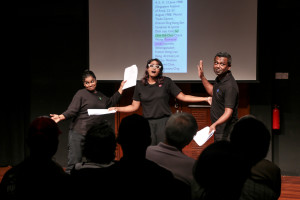
“The Vault: Absence Makes the Heart…” was an examination of the presence and absence of Indian roles in Singapore English-language theatre.
“I was very inspired by the possibilities of creating work that was based on the archive, after watching works by Lee Mun Wai and Nelson Chia,” says Alfian. “We had a lot of fun with [Absence Makes the Heart…], while at the same time platforming issues such as ethnic representation in theatre and cultural diversity. Centre 42 gave us all the help we needed, from the budget to the rehearsal room and performance space.”
The piece was brought back for another dramatised reading during Wild Rice’s Singapore Theatre Festival in 2018. On top of that, the experience itself also led to other opportunities, as the collaborators came together again this year to organise and conduct a playwriting course for Indian/Tamil writers.
Another work that was created under The Vault was Sau(dara) by Bhumi Collective, which was a response to Leow Puay Tin’s boundary-pushing 1988 play, Three Children. Its first work-in-progress iteration was presented in 2018, and it was recently re-performed as a double-bill titled Are You Game, Sau(dara)?, which was co-presented by Centre 42 and Malaysia’s Five Arts Centre.
“As a young company, the opportunity to be commissioned to do The Vault has helped increase our visibility within the industry,” shares Mohamad Shaifulbahri (aka Shai), the joint artistic director of Bhumi Collective. “If the arts industry had not yet accessed Bhumi’s works or know of us, this was a chance for them to do so, through their connection with Centre 42.”
In an attempt to encourage responses from even newer voices, we are currently working with students from the National University of Singapore’s Theatre Studies programme on another edition of The Vault. Their triple-bill, titled Gossip, Symphony, and Other Matters, is a response to Robert Yeo’s One Year Back Home, which will be performed at our Black Box on 20 April.
A place to play
But beyond programming showcases that are open to the public, we understand that it is also important to give artists the space and time to play and experiment, without the pressure of production. And that is why our Basement Workshop residency provides independent theatre practitioners and collectives a place to work out of, with heavily subsidised rental.
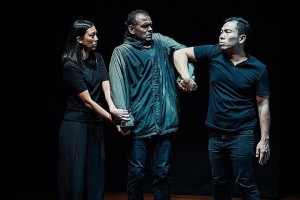
“The Singapore ‘d’ Monologues: And Suddenly I Disappeared” was recently nominated for Best Ensemble at The Straits Times Life Theatre Awards 2019. Photo: Memphis West Pictures
So far, we’ve supported around 30 projects under Basement Workshop. Recent examples include The Singapore ‘d’ Monologues: And Suddenly I Disappear – which was recently nominated for Best Ensemble at The Straits Times Life Theatre Awards – and Making A Stand. Both works were co-created between 2017 and 2018 by Peter Sau together with a group of local disabled artists.
“Centre 42’s Basement Workshop provided an affordable and conducive space for me to work with Deaf and disabled emerging artists, which enabled a mentorship and performance training to happen,” says Peter. “It is an intimate and safe home that favours the birth of new works and encourages risk-taking.”
While we never stipulate that Basement Workshop projects need to be staged, many works did end up at festivals we’ve partnered with, including the M1 Singapore Fringe Festival, Esplanade presents: The Studios, and the Singapore Theatre Festival.
“Centre 42 is a literal space that creates opportunities through programmes that can house works that are still in development,” shares Sharda Harrison, who has been in residence for several projects, including Bi(cara), which was developed and later performed at our space as part of 2016 Fringe Festival. “Often we watch finished products. However, it isn’t only the finished products that add to an industry, the process of theatre is equally important, and Centre 42 supports this.”
On top of offering subsidised rental, we also provide our artists in residence with documentation support through regular interviews, to help them chart their creative journeys at key milestones. These interviews – some of which are made public – can be viewed on our YouTube page and our blog.
“I really appreciated how our process of writing was archived and recorded by Centre 42 in different phases. It helped us clarify our intention of writing, allowed us to articulate what we wanted to talk about with the script, and also opened up a space for us to question and reflect on our writing process,” shares Neo Hai Bin, who wrote When the Cold Wind Blows in 2016 before the script was picked up by the Singapore Theatre Festival in 2018 at our recommendation. “For freelance artists like us, to be able to rent a space at an affordable price to work in, to devise, and to experiment different methodologies of creation is really, really precious.”
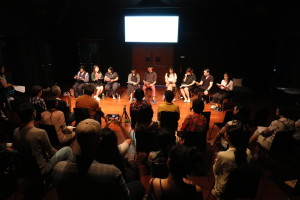
“Guest Room: First Act(s)” is a four-part series featuring eight plays-in-progress from a group of budding playwrights.
For works that need a testing ground for the artists to gather audience feedback, they could do so under our recently relaunched Guest Room presentation platform. This programmes provides artists with five days of free usage of the Centre’s facilities for rehearsals. On the fifth day, we would organise a closed-door dramatised reading and invite our industry partners and mailing list subscribers to attend.
“I see Centre 42 very much as an incubator of new works. Getting new work through the development stage is a long process, and particularly challenging without funding,” says Ivan Choong, a member of the team behind Guest Room: First Act(s), a four-part series featuring eight new works by a group of budding playwrights. “And it’s not just writers who benefit [from a programme like Guest Room] – the community as a whole benefits, as actors get a chance to practise, and audiences get a chance to see new works-in-progress. It involves the whole community.”
Building bridges
At its heart, Centre 42 is an intermediary that supports the creation, documentation, and promotion of text-based works for the stage. And over the last five years, we have increasingly expanded our role as a connector for different players within the performing arts scene.
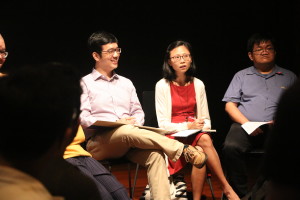
We have hosted several events that feature performing arts writers from both our Citizens’ Reviews programme and other arts publications. “In the Living Room: Year in Reviews 2018″, for instance, was co-hosted with ArtsEquator.
We have, for example, been fostering a community of performing arts writers through our Citizens’ Reviews programme, which is currently in its sixth edition. We believe that critics are an essential part of any theatre ecosystem, which is why we’ve hosted several events in partnership with arts publication including ArtsEquator (with whom we presented In the Living Room: Year in Reviews last year) and Arts Republic (who we’ll be co-hosting a Plunge talk on 21 April). Recently, we also organised the inaugural Performing Arts Writers Social, which is a chance for journalists from different publications to meet in a more casual setting.
“Reviewers can often seem like faceless entities behind screens, but events like [Year in Reviews and the Performing Arts Writers Social] put faces to names and give physical, tangible form to this very nascent practice, and legitimise it in a way,” says Akanksha Raja, the assistant editor of ArtsEquator.
“Communities of practice are so important. Particularly because writing can be such a solitary activity, these socials and other programmes allow spaces for connection and support,” agrees performance writer and researcher Corrie Tan. “I’ve also observed how the team tries to finesse the format and structure of these events to make every meeting as inviting and generative as possible!”
Additionally, we have also been bringing together dramaturgs from both Singapore and the wider Asia-Pacific region as the principal organising partner of the Asian Dramaturgs’ Network (ADN) since its inception in 2016. By presenting symposiums and labs in Japan, Australia, and Indonesia, we gave dramaturgs and artists a platform to share their knowledge and experience with one another. This in turn has led to an increased understanding of dramaturgical practices from around region, and we’re looking forward to bringing ADN home this May as part of the Singapore International Festival of Arts.
“Centre 42 has supported the work of ADN in a range of ways, including skilled organisation, detailed documentation and most of all intelligent, generous and thoughtful management of the projects that we have done. This has enabled ADN to grow and become more adventurous in its scope, as well as gain critical and reflective capacity in relation to what has already been done,” says Charlene Rajendran, the co-director of ADN.
Other initiatives we have supported include co-hosting talks and panel discussions with organisations such as the Singapore Management University’s Arts and Culture Management Program, National Institute of Education (NIE), and Asia-Europe Foundation. Additionally, we have also been the venue host for networks like Producers SG and supported arts community activities like the Arts NMP consultations.
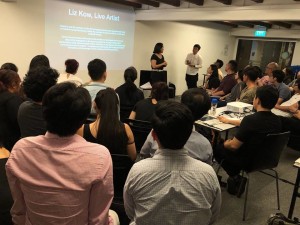
As a venue, we have supported various arts community events, including several editions of the Producers SG socials. Photo: Benjamin Chee
“Anyone could provide space, although not enough do; Centre 42 goes many, many steps beyond by making the blue house as fertile and nourishing a space as possible for these works,” says independent producer Mok Cui Yin. “Besides nourishing the work and processes of writers and theatre-makers, Centre 42 has also been incredibly supportive of the broader arts ecology, be it creating a safe space for arts advocates and community town hall meetings; facilitating and hosting meetings for arts management and producer networks such as Producers SG’s events, and visiting regional networks such as the Open Network for Performing Arts Management (ON-PAM).”
As a result of Centre 42’s involvement in such a wide range of initiatives and programmes, our beloved blue house has, over time, evolved into a safe space – a community centre of sorts – for everyone who work in or love the arts to come together. In fact, there are few things we enjoy more than an impromptu gathering of different artists who all just happen to be working on their own projects here at the same time.
“Coming to Centre 42 feels like coming home,” says Nabilah. “It’s like that tagline of the sitcom Cheers, ‘where everybody knows your name’, but much, much more. It’s biscuits when you’re having a long meeting, professional or personal advice, and vouching and fighting for you when it matters.”
“Support for C42 is support for an open space where multiplicities can meet, interact and bump into each other, leading to new synergies and possibilities,” agrees Charlene. “This is not about big productions and spectacular events with huge crowds and large audiences. It is about a variety of petri dishes being allowed to exist in conducive labs and then be observed and examined. It is space that encourages options to change, transform, invent, and innovate.”
As the oft-repeated saying goes, it takes a village to raise a child – and to support Singapore’s growing theatre community. As a non-profit organisation, Centre 42 is committed to developing the scene in every way we can. If you believe in the work that we do, please consider making a donation to help us “Grow the Cloud”. Your gift will go an especially long way right now, as every dollar will be doubled by both the Cultural Matching Fund and the Bicentennial Community Fund. Furthermore, our Institutions of Public Character (IPC) status has just been renewed, which means that all donors will receive a 250% tax deduction. We hope you will join us as we continue to do our part for the theatre community, for the next five years and beyond!
By Gwen Pew
Published on 5 April 2019
Help us Grow the Cloud and receive a 250% tax deduction by donating here.

